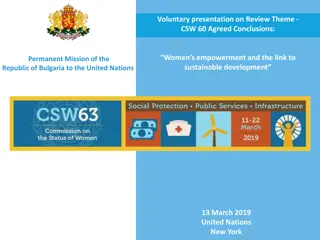
Social Entrepreneurship in Bulgaria: Opportunities and Limitations
Explore the opportunities and limitations for social entrepreneurship in Bulgaria, including insights on the legal framework, prerequisites, and existing challenges. Learn about the initiatives, policies, and the need for sustained support to drive social enterprise growth in the country.
Download Presentation

Please find below an Image/Link to download the presentation.
The content on the website is provided AS IS for your information and personal use only. It may not be sold, licensed, or shared on other websites without obtaining consent from the author. If you encounter any issues during the download, it is possible that the publisher has removed the file from their server.
You are allowed to download the files provided on this website for personal or commercial use, subject to the condition that they are used lawfully. All files are the property of their respective owners.
The content on the website is provided AS IS for your information and personal use only. It may not be sold, licensed, or shared on other websites without obtaining consent from the author.
E N D
Presentation Transcript
OPPORTUNITIES AND LIMITATIONS FOR THE SOCIAL ENTREPRENEURSHIP IN BULGARIA
INFORMATION FROM THE EUROPEAN COMMISSION FOR GROWTH AND SOCIAL ECONOMY: Social enterprises in Europe - 2 million (10% of all EU enterprises) Employees in social enterprises - more than 11 million (6% of EU employees) They exist in all EU Member States Different legal forms, organizational structures and different purposes: from agriculture and banking to providing employment and shelter Different fields of work They realize various relationships between people and institutions
PREREQUISITES IN BULGARIA The Social and Solidarity Economy Enterprises Law adopted in 2018 aims to encourage the development of the social and solidarity economy as a business sector with specific rules for : Improving the access to employment and training for the acquisition or improvement of vocational training in order to improve the standard of living of disadvantaged people; Creating conditions to support persons from vulnerable social groups for social inclusion and independent living; Reducing the social inequality; Sustainable territorial development.
PREREQUISITES IN BULGARIA Start of a Coordinated and Focused State Policy for the Social Economy and Social Entrepreneurship - The National Concept for the Social Economy, adopted on 04.04.2012, as well as the series of social economy action plans. Law on the Enterprises of the Social and Solidarity Economy - regulates the public relations related to the social and solidarity economy, the types of subjects and the measures for their promotion, the conditions and the procedure for the activity of the social enterprises. Lack of special registration regime - any economic operator can self-determine that he performs the said activity - freedom and opportunity for more self-regulation of the sector. Declining tendency for registration and licensing regimes - supports the development of business initiatives. Low corporate tax (10%). Operational programs - focus on the long-term unemployed and young people under 29, not just people with disabilities.
LIMITATIONS Despite having a National Concept and Action Plans, the social economy lacks an effective state development policy that purposefully and comprehensively stimulates and supports social enterprises in the long term. In recent years, a volatile business climate as a result of the effects of the global economic crisis and the volatile political environment. There is no support for the sustainability of NGO activities - they remain fully dependent on project funding, which is short-term. Despite the widening range of vulnerable social groups, long-term programs promoting supported and protected employment are still lacking. The main target group continues to be the group of people with disabilities. The financial mechanisms that ensure the start-up or maintenance of an activity are severely limited.
FINANCIAL LIMITATIONS Bank credits - without much relief for some categories of social enterprise, and for NGOs - practically inaccessible. National grant funding is limited and few social enterprises can benefit. There is a lack of funding programs at the municipal level, as well as real support from local authorities. The operational programs rarely fund entrepreneurial activity as such, and focus on employment. The access is primarily for larger organizations that have the financial resources to prefinance their activities. The focus is on short-term project results, which are largely quantitative and the support of an overall long-term impact is avoided. The dependence on grant funding is increasing.
CHALLENGES The Social enterprises have the capacity to become serious partners of the institutions, both nationally and locally, in addressing the pressing social problems of the local community. This partnership should be fostered through: Improvement of existing legislation; Increasing grant funding and networking; Opportunity for accessible and easy bank credits; Extending the support of regional and local authorities; Creating a more favorable business environment for social entrepreneurship; Good awareness and permanent training of the key figures that will provide a resource for the whole process of creation and development of social entrepreneurship.






















